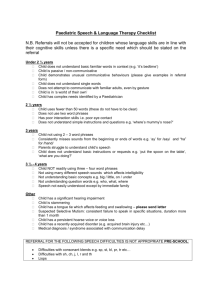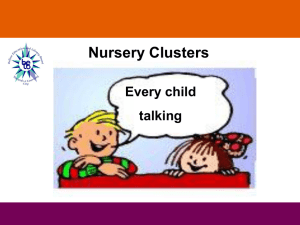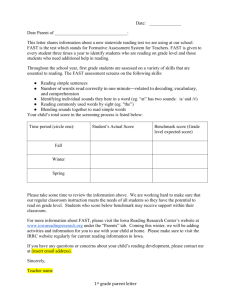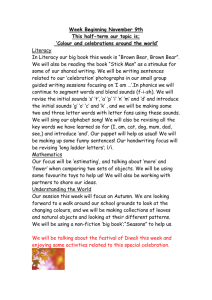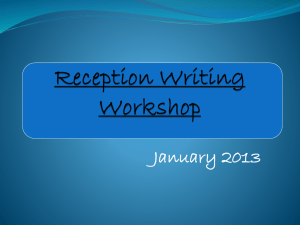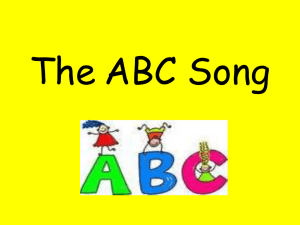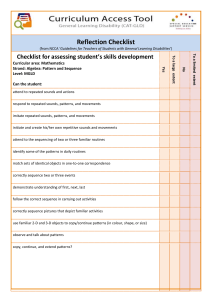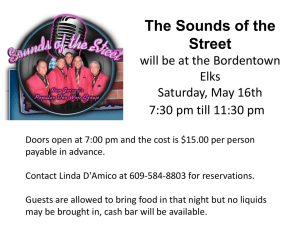Guidance Leaflet - South West Yorkshire Partnership NHS
advertisement
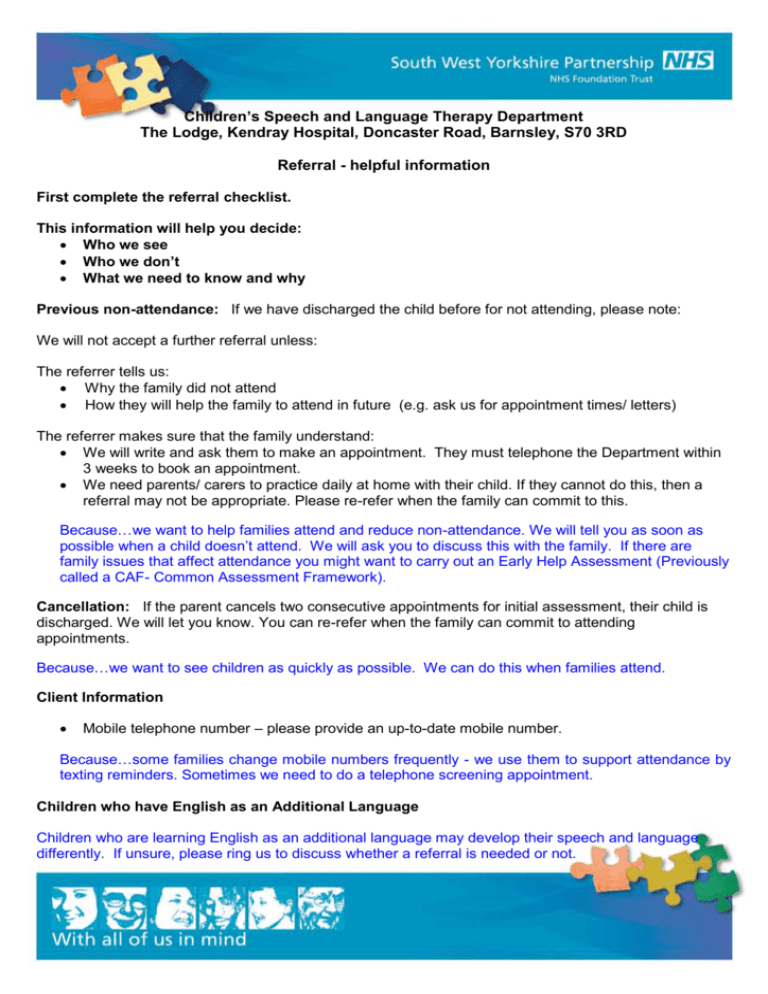
Children’s Speech and Language Therapy Department The Lodge, Kendray Hospital, Doncaster Road, Barnsley, S70 3RD Referral - helpful information First complete the referral checklist. This information will help you decide: Who we see Who we don’t What we need to know and why Previous non-attendance: If we have discharged the child before for not attending, please note: We will not accept a further referral unless: The referrer tells us: Why the family did not attend How they will help the family to attend in future (e.g. ask us for appointment times/ letters) The referrer makes sure that the family understand: We will write and ask them to make an appointment. They must telephone the Department within 3 weeks to book an appointment. We need parents/ carers to practice daily at home with their child. If they cannot do this, then a referral may not be appropriate. Please re-refer when the family can commit to this. Because…we want to help families attend and reduce non-attendance. We will tell you as soon as possible when a child doesn’t attend. We will ask you to discuss this with the family. If there are family issues that affect attendance you might want to carry out an Early Help Assessment (Previously called a CAF- Common Assessment Framework). Cancellation: If the parent cancels two consecutive appointments for initial assessment, their child is discharged. We will let you know. You can re-refer when the family can commit to attending appointments. Because…we want to see children as quickly as possible. We can do this when families attend. Client Information Mobile telephone number – please provide an up-to-date mobile number. Because…some families change mobile numbers frequently - we use them to support attendance by texting reminders. Sometimes we need to do a telephone screening appointment. Children who have English as an Additional Language Children who are learning English as an additional language may develop their speech and language differently. If unsure, please ring us to discuss whether a referral is needed or not. Specific Difficulties: Eating and/or Drinking Difficulties We will return the referral if the referrer does not provide an up to date contact number. Because…we need to do a telephone assessment within 2 working days of receiving the referral. We can only do this if the contact details are correct. If the child is in hospital: please give the hospital name, ward and telephone number. Because…we need to see the child quickly and in the right place. Please provide a Paediatrician/ medical report if possible. Because… need to know any medical reasons for the child’s eating and drinking difficulty e.g. prematurity, cerebral palsy etc. Autistic Spectrum If you think there is a social communication or Autistic Spectrum difficulty, please refer to a Paediatrician. Because…Paediatricians and Speech and Language Therapists are involved in assessment for this condition. We need the Paediatrician’s information for our assessment. A delay in this referral means delayed access to support for the child and their family. Speech and Language Therapists assess the child’s speech, language and communication skills. We share this information to help with diagnosis. We refer to other professionals if needed. We will only offer therapy if the child has a specific speech and/or language difficulty. Because…Autism affects many areas of a child’s development and is a life-long condition. Language and communication difficulties are only part of this diagnosis. The Speech and Language Therapist will tell people (e.g. parent/ carer/ school staff) about the child’s language levels, how this affects them, and how to help. This is usually by using helpful interaction skills and the right environment. The therapist will only see the child for ongoing therapy when specific language difficulties have been identified. The Communication and Interaction Team (Inclusion Services) provide advice and support for children with Autism and related conditions in School or Nursery. Learning Difficulties We will not accept a referral when the child’s speech and language development matches their overall level of development. This might be below their actual age if a child has learning difficulties. Because…we see children with specific speech, language or communication and/or eating and drinking difficulties. Children with learning difficulties sometimes have delayed speech and language skills - this is not a specific speech, language or communication difficulty. We do not see children for therapy if their understanding matches their general level of development. However, we may offer training courses for parents and professionals. These give general strategies and activities to help parents and professionals create a supportive environment for ongoing language development. If the child’s understanding or language use is below their general developmental level, we will consider your referral. We will need a report from at least one of the following: o Educational Psychologist o School (we need the child’s levels across the curriculum) o Paediatrician or Associate Specialist Because…we need to look at other professional’s assessments and our own. This helps us decide if the child’s difficulties are below their general levels. If not, they do not need direct therapy but may be offered training. Difficulty Understanding or Using Language – Specific Language Impairment A specific language difficulty is a difficulty where the child’s understanding and spoken language are significantly below their general learning levels. If the child is nursery or school-aged, we will consider your referral but will need a report from at least one of the following: o Educational Psychologist o School (we need the child’s levels across the curriculum) o Paediatrician or Associate Specialist Because…we need to look at other professional’s assessments and our own. This helps us decide if the child’s difficulties are below their general levels. If not, they do not need direct therapy but may be offered training. Voice difficulties This is when the child: regularly has a hoarse voice, loses their voice, feels tightness, has a “lump in the throat” or uses an unusual pitch for their sex/age. If so, please ask for the child to be referred to the Ear, Nose and Throat (ENT) Department of their local hospital. If needed, the ENT Consultant will then refer to Speech and Language Therapy. Because…we are not allowed to see a child for a voice difficulty unless they have been seen by ENT. Stammering/ Stuttering (stammering is the same as stuttering) Stammering is: repeating words or sounds (‘I-I-I-I want…’ or ‘d-d-d-dog’), stretching sounds (sssssssausage), or no sound coming out. Some children also show extra face or body movements when talking. Some children hide their stammer but can still be referred. These children may appear fluent, very quiet or withdrawn. They may avoid or change words e.g. ‘Can I have a bis, sweet?’ They may avoid situations e.g. pretending not to know the answer, not putting their hand up in class. They will have stammered openly in the past. Pronunciation difficulties (speech sounds) We will not accept a referral for a lisp (“s” is said as ”th” so sock becomes thock ) or difficulties with “r” and “l” unless the child is 8 years or older or the CHILD is significantly concerned about this. Because… “s”, “r” and “l” may not naturally develop until 7-8 years. Usually the child can still be understood, so they might not be bothered about changing their speech. Lisps are more socially acceptable (some television presenters have lisps) and this is not usually a problem. We will not accept a referral for a child who only changes “th” to “f” and “the” to “v” (so thing beomes fing and this becomes vis). Because…lots of children do this. It is part of the English accent changing and we do not work on accents. Children need to learn the different spelling, BUT we already do this for lots of other words (we say “sed” but spell it as “said”). Please refer all children who sound “nasal”, “speak through their nose” or have a history of food/ liquids coming down their nose – whatever their age or pronunciation skills. Because…it might be a physical difficulty (a difficulty with the roof or muscles in their mouth) which needs further medical investigation. Please refer all children who have no consonants at 2 years or older or they only use vowels and “m” and “n”. Because…it might be a physical difficulty (a difficulty with the roof or muscles in their mouth) which needs further medical investigation. Tell us as much as you can about sounds the child finds difficult. Parents are often good at giving this information. This helps us decide what the problem is, whether it’s typical for their age, and whether the child needs therapy at the moment. Children develop different sounds at different ages. They learn easy sounds first. They might use an easier sound for a harder sound to make talking easier. Their speech can often be hard to understand. They gradually learn to say more and more sounds. Children may not say all the sounds of English correctly until they are 7 years or older. A speech (pronunciation) difficulty happens when the child is not using typical sounds for their age/ stage of development, or when they miss sounds out, or use atypical sounds. We only need to see children whose speech sound use is below their age/ stage of development: e.g. if a child is 6 years old but generally developing at a 4 year level, we would only see them if they couldn’t do what a typical 4 year old would do. Developmental Age Consonant Sounds Developing Up to 2½ years p, b, m, n, w Typical errors at this age, no referral needed Words may consist of repeated syllables e.g. “flower” said as “fafa” “digger” said as “didi” Sounds may be missed off the end of words e.g. “bike” said as “bye” 2½ to 3 years t, d, g, k, h Sounds may be missed off the end of words e.g. “bike” said as “bye” “k/c” said as “t” “g” said as “d” 3 – 4 years s, f, y ‘l’ begins to develop but can take up to 7 years 4 – 5 years sh, ch, v, z, j ‘r’ begins to develop but can take up to 7-8 years 5 – 6 years e.g. “ car” said as “tar” e.g. “girl” said as “dirl” “s” said as “t” e.g. sock said as “ tock” “f” said as “p”/”b” e.g. fish said as “pish” or “bish” “y” said as “l”/” w” e.g. yellow said as “lellow” or “wewow” “l” said as “w” e.g. leaf said as “weaf” “sh” said as “s” “ch” said as “t” “v” said as “b” “z” said as “d” “j” said as “d” “r” said as “w” e.g. “shoe” said as “sue” e.g. “chair” said as “tair” e.g. ”van” said as “ban” e.g. “zip” said as “dip” e.g. “jam” said as “dam” e.g. “ring” said as “wing” s-blends begin to develop e.g. sp, st, sk, sm, sn Where 2 sounds occur together, one may be missed off e.g. “spoon” said as “poon” or “soon” “ snake” said as “nake” or “sake” r and l blends still developing e.g. pl, cl, br, cr, Where 2 sounds occur together, one may be missed off or simplified e.g. “play” said as “pay” or “pway” “ brown” said as “bown” or” bwown” We do not see children under 4 ½ for pronunciation therapy usually. Because… Many children grow out of it naturally by this age, so therapy is not necessary. Many children below this age can not follow adult directed tasks needed for therapy to work. Many children need therapy for sound awareness skills. These don’t usually develop until a child is 4½ years or older. Children’s speech and language therapy The Lodge, Kendray Hospital, Doncaster Rd, Barnsley, S70 3RD Tel: 01226 434248 Email: swy-tr.barnsleyspeechtherapy@nhs.net Website: www.barnsleyspeechtherapy.co.uk
